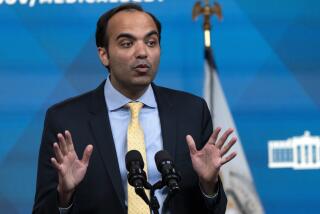House Passes Bill to Curb Bank Holds on Deposits
- Share via
WASHINGTON — The House, responding to one of the most common consumer complaints against banks, Thursday overwhelmingly approved a law that would greatly reduce the amount of time a bank may hold its customers’ deposits before allowing them access to the funds.
Under the legislation, after a three-year phase-in of the law, funds from deposits of all local and in-state checks would become available to bank customers the next business day. All other checks would have to become available for withdrawal by the fourth business day after they were deposited.
Litany of Stories
The bill passed 282 to 11 after House Banking Committee Chairman Fernand J. St Germain (D-R.I.) recited a litany of stories in which hapless customers discovered that their checks had been bounced--despite recent deposits that would cover their withdrawals--because their banks had the funds on hold.
Because of “an arbitrary two-week hold” on a $1,400 deposit, for example, a Boston woman “ended up with $296.30 in return check fees and the embarrassment of having checks for such items as her son’s Boy Scout uniform dishonored by the bank,” St Germain said.
“For the well-heeled with big balances in their checking accounts, the need for this legislation may indeed seem remote,” he added, “but for the factory worker, the salaried employee, the retiree of modest means and to others who must pay their basic living expenses out of their weekly or monthly income, these arbitrary check holds are a disaster.”
A version of the bill has been introduced in the Senate by Sen. Christopher J. Dodd (D-Conn.), but its prospects are uncertain. Senate Banking Committee Chairman Jake Garn (R-Utah) has indicated that he would prefer to handle the issue as part of broader banking legislation, and some in the Senate are expected to voice reservations about the strict timetable set forth in the House bill.
Before passing the bill, the House loosened the measure’s restrictions by approving, 156 to 146, an amendment by California Rep. Norman D. Shumway (R-Stockton) that would allow banks to hold funds when they had a “reasonable belief” that the depositor was engaging in fraud or that the writer of the check was about to go bankrupt. Shumway’s amendment would require banks to notify customers within two working days of a decision to hold funds.
Shumway complained that as the bill originally was drafted, it “places banks in a straitjacket . . . denies them any discretion.” He insisted that his amendment was “not designed to gut the bill . . . not designed to be a pro-bank, anti-consumer measure.”
2nd Amendment Rejected
The House rejected, 211 to 80, a subsequent amendment by Shumway that would have discarded the bill’s strict schedules for releasing funds and instead directed the Federal Reserve to develop within three years legislation to revise existing law.
“Make no mistake about this (amendment). It kills the bill,” Rep. Charles E. Schumer (D-N.Y.) warned during debate of the provision. He added that it would “kill any hope the consumer had for fairness.”
The Federal Reserve has asked banks to voluntarily address problems created by longer-than-necessary holds on deposits, but the result has been uneven policy by banks nationwide.
Legislation similar to the House bill has been passed in five states, including California, where the law went into effect in 1984. Fifteen other states also are considering bills that would allow consumers to write checks more quickly on their deposits.
Proponents of the bill insist that the danger of banks being unable to collect funds from deposited checks is a relatively minor one and point to statistics that show that less than 1% of all checks are returned unpaid. Of those, 60% are paid the second time they are presented.
Profitable Business
Moreover, they say that the fees banks collect in returning checks make bounced checks a profitable business and cite a Bank Administration Institute study estimating that banks earn $3.4 billion annually from returned checks.
While fees may range as high as $30 for each check that is returned, it costs banks only 36 cents to return a check, Federal Reserve Gov. Preston Martin said in testimony before the House Banking Committee.
The banking industry, bitterly opposing the bill, insisted that such statistics would become meaningless if the bill became law because it would encourage fraud. The additional losses, banks say, would have to be passed along to consumers in the form of higher fees for regular services.
In response to that criticism, the bill instructs the Federal Reserve to improve the nation’s check-clearing system, an action the Reagan Administration estimates would cost $30 million a year.
More to Read
Get the L.A. Times Politics newsletter
Deeply reported insights into legislation, politics and policy from Sacramento, Washington and beyond. In your inbox twice per week.
You may occasionally receive promotional content from the Los Angeles Times.










